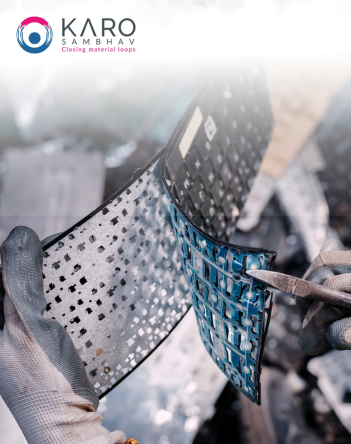Karo Sambhav collaborates with leading organisations to jointly develop industry frameworks, standards, governance mechanisms, systems and processes that advance the transition to circular economy. know more about our alliances.
Are you familiar with EPR services? EPR, or Extended Producer Responsibility, is a significant policy approach that commissions producers, manufacturers, entrepreneurs, bulk consumers, and recyclers to evaluate the environmental costs associated with products. It is a strategy that obliges business owners and producers to undertake the responsibility of collecting, treating, and disposing of products in an environment-friendly manner. Wondering why EPR authorization is crucial in the present times? Let’s keep reading!
To begin with, let’s evaluate a few important stats:
India ranks 3rd on a global scale as one of the leading countries of e-waste producers.
The country generates over 3.46 million tonnes of plastic waste every year.
As per reports, India is expected to witness a 31% hike in e-waste production.
Are you alarmed watching the numbers? Sadly, waste is one of the growing problems not only in India but in continents globally. It is a leading cause of environmental crises, poor health conditions, and economic stress.
Plastic, glass, electronics, or batteries, the mounting volumes of waste worldwide, is a serious concern. Landfills are overflowing, deadly outbreaks are becoming an order of the day, air quality is depleting with time, and global warming stands out as an evident issue. Do you know what’s worse? The number of natural resources is shrinking with time. Contrary to what many believe, natural resources are finite and prone to extinction. With the increasing consumption of products, the stress of sourcing and mining raw materials has spiked by leaps and bounds. Simply put, our earth is bleeding.
Rising waste is a threat to survival!
How often do you think before trashing a product after use? Do you care before popping a food package in the bin or handing out your broken electronic goods to a random scrap dealer? Rarely, for sure! It is time to stop and question – what really happens to your trashed products? It all ends up clogging the dump yards. Sadly, only a meagre portion of the waste is effectively recycled and pushed back into the production cycles. More than 70% of the waste is left untreated and sullying the environment. Little do you realise that this waste contains heaps of toxic chemicals and hazardous metals that leach into the environment.
Furthermore, the chemicals contaminate the groundwater and pollute the air. It is no secret that these chemicals also aggravate harmful greenhouse gas emissions. Did you know that toxic emissions such as carbon monoxide and hydrogen sulphide contribute to climate change and environmental damage? What’s more, the chemicals contaminate the air and cause adverse health conditions. Respiratory disorders, chronic diseases, cancer, allergic reactions, and the list goes on.
From concerned environmentalists to the top e-waste companies in India, embarking on a strategic waste disposal method has been narrowed down as the only promising option. Appropriate e-waste disposal is more than recycling and refurbishing trashed goods. It is critical to nip in the creation of waste first.
It is no secret that one of the foremost non-biodegradable contributors to the trash pile is plastic waste. If you haven’t heard it already, plastic pollution gradually takes down an ecosystem’s ability to combat and adapt to climate change. Thus, creating a circular economy for plastic waste is more essential than ever.
Do you know what circular economy is all about? A circular economy is a calculated model of production and consumption that focuses on reducing, reusing, and recycling waste. Unlike a traditional linear model of take-make-and-dispose, circular economy prioritises rethinking product designs to remain longer in use. The new and effective approach intends to uphold the value of products and raw materials for as long as possible. Also, circular economy incentivise producers, business owners, and consumers to practice reusing products instead of scrapping or extracting new resources for a newer production line.
Are you trying to figure out why EPR authorization is at all necessary? Simply put, Extended Producer Responsibility is an industry-funded and collaborative approach to drive and increase maximised adoption of circularity. If you are not already aware, EPR registration is now mandatory for producers and manufacturers in the electronic sector. Frankly, it is an additional responsibility that encourages businesses to initiate a reverse and strategic collection mechanism to segregate and dispose of waste in an environmentally-friendly fashion.
A big YES!
Manufacturers and entrepreneurs associated with the trading of electronic items such as computers, LED parts, dishwashers, air-conditioners, Smartphones, etc, must acquire an EPR certificate to conduct business. The certificate is an indispensable requisite that makes it obligatory for businesses to channelise e-waste in environmentally sound and government-ideated mechanisms. Why just e-waste? Producers of plastic goods, too, are bound to acquire EPR and customs authorization to run their trades. As per the norms, authorized manufacturers and business owners must channelise the collection, dismantling, and disposal of end-of-life products without hurting the environment.
Typically, EPR authorization entrusts manufacturers with financial and physical responsibility for the appropriate treatment and disposal of waste. It ingrains the need to rethink product designs that are easy to recycle and eco-friendly.
EPR authorization and certificates are closely monitored and maintained by the Central Pollution Control Board
It is imperative for businesses to associate and clinch an agreement with authorized recyclers and PROs like Karo Sambhav to collect and deposit all post-consumer waste to the company every quarter.
Manufacturers of e-waste and plastic waste are obligated to file quarterly returns with the CPCB to avoid penalties of non-compliance.
E-waste disposal or plastic waste management, EPR is implemented to create more equitable and efficient waste management. The policy enhances the recyclability of products and achieves maximum resource efficiency.
Karo Sambhav collaborates with leading organisations to jointly develop industry frameworks, standards, governance mechanisms, systems and processes that advance the transition to circular economy. know more about our alliances.





